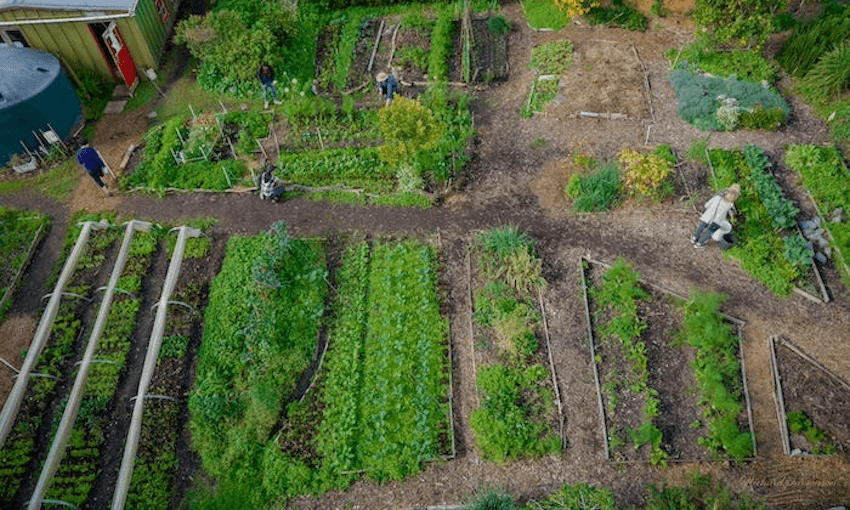Community Supported Agriculture is a model that’s common overseas, but still little known in Aotearoa.
This is an excerpt from our weekly food newsletter, The Boil Up.
Do you know where your eggs came from? How about your chicken, your milk, bananas, the salad leaves you buy in those air-filled plastic bags? Most of us have no idea where anything we eat originated, whether it was grown in a field or a greenhouse, farmed with machinery fed by fossil fuels, sprayed with chemicals, or the journeys that brought it to our supermarket shelves.
For the last 13 weeks, I’ve been able to say I know where my eggs come from. Each week I visit Kelmarna Community Farm, an empty egg carton tucked in my bag which I fill with heavy, buttery-yolked eggs. Sometimes I go on a day when the Farm Shop is open and I can fill my own container with peppery salad mix, or pick up a bundle of purple radishes, furry quinces or lacy-topped carrots. Sometimes I have time to wander through the market gardens to the food forest, to visit the chooks beneath the banana trees and thank them as they peck at their feed, a combination of perennial crops, waste products and insects grown onsite.
My eggs come from Kelmarna’s layer hen project, a small scale, resilient operation which utilises local food waste, feeds a local market and provides valued livelihoods. At the start of the autumn season, I joined the egg CSA, an acronym that stands for Community Supported Agriculture, a model that’s common overseas but still little known in Aotearoa. CSA basically connects community members directly with farmers and allows us to buy into the farm’s produce at the start of a growing season and receive a portion of the crop throughout the season. Kelmarna’s egg and vegetable CSAs are just some of the enterprises they offer – they also have a community composting programme, organic beehives, the layer hen project, grazing sheep, the Farm Shop and CSA programmes, regular workshops, horticultural therapy and popular volunteer gardening programmes – all in addition to the unending central mahi of growing.
Those in the community often describe it is a sanctuary, Kelmarna’s general manager Sarah McFadden tells me. It’s been that way since the lease was first secured in 1981, when the 4.5-acre pocket of Ponsonby land gave rise to the Kelmarna Community Gardens Trust. Back then, Ponsonby was a different scene; with its derelict buildings and low rents (imagine!), the suburb was vibrant, populated by artists, bohemians, LGBTQIA+ folks and Polynesian migrant workers, the perfect place for an urban farm to take root with a mission of modelling self-sufficiency through organic growing practices. Over its 40-plus year history, Kelmarna has seen many incarnations, but these roots have remained intact, growing stronger, rhizoming out. In 2024, the farm functions as a hub for the ecological food movement, championing and demonstrating a regenerative local food model that supports climate change mitigation, urban resilience and community wellbeing.
When Sarah explains that funding for environmental projects in Aotearoa is scarce, and how what little there is tends to favour conservation efforts, leaving initiatives centred on food and farming at a disadvantage, I’m aghast. Sure, urban farming may not seem like the most vital charity when there are children going hungry, but it is all connected. Decentralised food systems could provide communities with locally grown, nutrient dense food, while also cutting costs and carbon footprints. They also offer myriad other benefits: land regeneration, educating their communities towards self-sufficiency, the creation of green jobs, providing opportunities for connection to reduce social isolation and also calm, green spaces for people to walk and spend time.
But I am also aghast because it is so short-sighted. As climate change progresses, our food security is at risk. C40’s The Future We Don’t Want report from 2018 suggested that by 2050, 2.5 billion people living in over 1,600 cities will experience declining agricultural outputs. “To ensure that growing cities have enough to eat in the future, it is critical that urban areas start considering their long-term food security now.” Their suggestions for how to start this? Invest in local, organic produce, employ compost as a resources and utilise urban land for local food production. In Kelmarna and other urban farms, we have models for how to do this, for what a better, more resilient, climate-friendly food system for Aotearoa could look like.
After missing out on vital funding this year, Kelmarna has launched a fundraising appeal to keep the farm gates open and help move further forward on the path of self-sufficiency that they’ve been paving. If you’re able to donate, you’ll be supporting the future of the farm, but also potentially the future of kai in Aotearoa.

